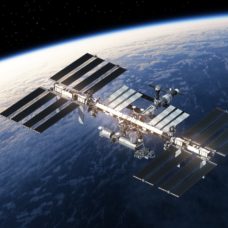4/28 update: When this article was first published, we asserted that SpaceX was building a Mars orbital depot for BFR missions to Mars. In fact, the depot, colony, and refueling infrastructure will be constructed on Mars’s surface. Thanks to Ben, we corrected this error.
Researchers propose “multi-mission campaigns” as a new approach to optimize the efficiency of space mission planning.
“Earth is the cradle of humanity,
but one cannot remain in the cradle forever,”
– Konstantin E. Tsiolkovsky
As one of the three founding fathers of modern astronautics and rocketry, Tsiolkovsky had high hopes in humanity’s ability to brave space.
When he died in 1935, there were still a couple of decades ahead before rockets started making spaceflight history.
Escaping Earth’s gravitational pull and venturing into interplanetary space proved to be tough yet possible.
Nearly sixty years after the first human left Earth’s orbit, and about fifty after the first trip to the Moon, space-mission planning is still no cakewalk.
The complex logistics of space travel rest on two main factors: how much time a space mission would take to get to a destination, and how much fuel and other supplies it will need for that.
Space Mission Planning for More Efficient Space Travel
Though a space program encompasses multiple missions, each space mission is planned and maintained alone in terms of direct logistics.
However, space engineers from the University of Illinois at Urbana-Champaign claim that multi-mission planning is a more efficient use of time, fuel, and other resources needed for each flight.
Koki Ho, an assistant professor at the UIUC’s Department of Aerospace Engineering, works on the optimization of space systems.
Ho and two of his graduate students, Hao Chen and Bindu Jagannatha, set out to create a framework to optimize the use of space mission resources, including vehicle design.
To do that, they investigated the design of past planned missions and ran computer simulations.
According to Ho, and based on what we have today, the solution for efficient space mission planning is to ditch the one-mission-at-a-time model:
“One way to do that is to consider campaign designs, that is, multiple missions together—not just launching everything from the ground for every mission like Apollo did. In a multi-mission campaign, previous missions are leveraged for subsequent missions. So if a previous mission deployed some infrastructure, such as a propellant depot, or if work had begun to mine oxygen from soil on the moon, those are used in the design of the next mission,” said Ho.
The team is going as far as proposing to make space vehicle designs an integral part of the campaign for maximum efficiency.
In addition to redesigning vehicles, Ho also suggests what he calls “propellant depots”, strategically-placed along the path.
Preparatory missions using low-thrust propellant systems would carry fuel and other supplies for upcoming manned missions which use high-thrust systems due to lack of available time.
Ho published two studies that cover the proposed framework. You can read them here in the Journal of Spacecraft and Rockets: 1, 2.
“Way Ahead of you,” Says Musk
Elon Musk and SpaceX’s plan for Mars colonization with the BFR rocket will leverage a multiple-mission framework.
In fact, the first BFRs sent to Mars in 2022 will be used to find water and create power infrastructure for future BFR flights to Mars. From here, subsequent missions will bring crews and work on creating a fuel plant for all return flights to Earth. With each subsequent flight, the Mars colony will grow.
Musk mentions that, eventually, sustaining a large multiplanetary presence will require several launches a day and thousands per year. As he mentions, right now, there about 60 orbital launches per year. Bridging the gap between those launch numbers will require multiple mission systems.
Read More: What you Missed From Elon Musk’s BFR, Mars Colonization Announcement
If all goes as planned, all of the BFR missions will aid each other simultaneously as Musk and SpaceX work towards the goal of 1,000,000 colonists on Mars by at least the middle of this century.


















Can you support the claim that SpaceX intends to create an orbital depot at Mars? That didn’t match any public announcement or employee remarks I’ve seen.
It isn’t a very logistically sound concept. The present mission architecture gets to Mars with just enough fuel to land. If they get crafty and aerobrake into orbit, they are liable to not have enough fuel to land. And certainly none for the depot. To get fuel to return they must land, build the ISRU plant, gather ice and produce fuel.
A Mars station doesn’t make a ton of sense, overall, until there is local industry to support it.
Hi Ben, you are absolutely right. The article will be changed to reflect that the Mars depot, power infrastructure, and fuel will be placed on the surface of Mars during the 2022 cargo mission. I confused the proposed cargo mission during my research. Thanks for pointing this out!